

The Science of Scientific Writing. This article was originally published in the November-December 1990 issue of American Scientist.
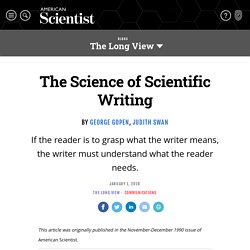
Science is often hard to read. Most people assume that its difficulties are born out of necessity, out of the extreme complexity of scientific concepts, data and analysis. We argue here that complexity of thought need not lead to impenetrability of expression; we demonstrate a number of rhetorical principles that can produce clarity in communication without oversimplifying scientific issues.
The results are substantive, not merely cosmetic: Improving the quality of writing actually improves the quality of thought. The fundamental purpose of scientific discourse is not the mere presentation of information and thought, but rather its actual communication. Readers do not simply read; they interpret. This interplay between substance and structure can be demonstrated by something as basic as a simple table.
If the two sides of this simple table are reversed, it becomes much harder to read. 1. 1. How to Summarize a Research Article. Paper reading. Paper analysis worksheet. How to (seriously) read a scientific paper. Adam Ruben’s tongue-in-cheek column about the common difficulties and frustrations of reading a scientific paper broadly resonated among Science Careers readers.
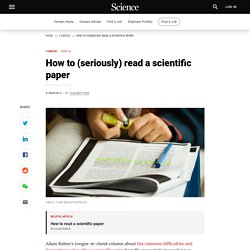
Many of you have come to us asking for more (and more serious) advice on how to make sense of the scientific literature, so we’ve asked a dozen scientists at different career stages and in a broad range of fields to tell us how they do it. Although it is clear that reading scientific papers becomes easier with experience, the stumbling blocks are real, and it is up to each scientist to identify and apply the techniques that work best for them.
The responses have been edited for clarity and brevity. How do you approach reading a paper? I start by reading the abstract. More from our How-To series I first get a general idea by reading the abstract and conclusions. If I’m aiming to just get the main points, I’ll read the abstract, hop to the figures, and scan the discussion for important points. All the time. Writing an Article Critique. What is an article critique?
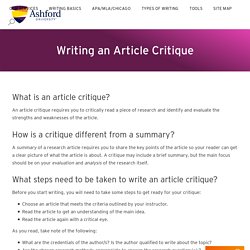
An article critique requires you to critically read a piece of research and identify and evaluate the strengths and weaknesses of the article. Newest Scientific Paper. HowToReadSciArticle. Infographic: How to read a scientific paper. Much of a scientist’s work involves reading research papers, whether it’s to stay up to date in their field, advance their scientific understanding, review manuscripts, or gather information for a project proposal or grant application.
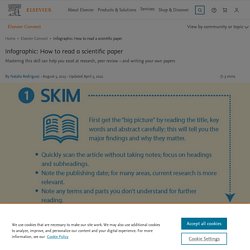
Because scientific articles are different from other texts, like novels or newspaper stories, they should be read differently. Research papers follow the well-known IMRD format — an abstract followed by the Introduction, Methods, Results and Discussion. Critically reading a paper. How to Evaluate Journal Articles - How to Do Library Research - Research Guides at Colorado State University Fort Collins. Pour évaluer un article de journal, notez: Le style du journal Pour les dissertations du niveau du collège, on obtient ces informations, la plupart du temps dans des journaux scientifiques ou savants .
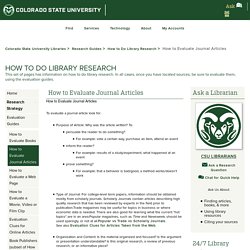
Les journaux savants contiennent des articles qui décrivent des recherches de haute qualité qui ont été passées en revue par des experts en la matière avant leur publication. Les magazines commerciaux peuvent être utiles pour les affaires ou quand on a besoin de données economiques. Les magazines populaires, tels que Time et Newsweek devraient être utilisés avec réserve ou pas du tout. Pour plus de détails sur la façon de distinguer les journaux populaires, des journaux professionnels, des journaux savants, voir: Magazines populaires, magazines professionnels, journaux académiques. L'Audience. Traduit par Michele Nelson. How to evaluate journal articles. How to read a scientific study. Over the years I have received many emails about scientific research and health care.
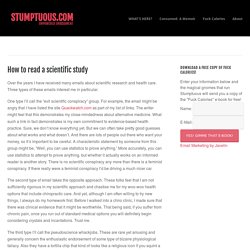
Three types of these emails interest me in particular. One type I’ll call the “evil scientific conspiracy” group. For example, the email might be angry that I have listed the site Quackwatch.com as part of my list of links. The writer might feel that this demonstrates my close-mindedness about alternative medicine. What such a link in fact demonstrates is my own commitment to evidence-based health practice. The second type of email takes the opposite approach. The third type I’ll call the pseudoscience whackjobs. Evaluating the Literature : Medscape. Services and Web Sites Covered This policy describes what information may be collected about you when you use the services made available through the WebMD Health Professional Network (as defined below), how this information may be used, how you can control how your information is used and what precautions are taken against unauthorized access or use of your information.
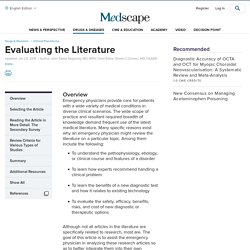
The services made available through the WebMD Health Professional Network may be provided in a variety of mediums and devices now known or hereinafter developed including mobile applications, and include without limitation news, reference tools and applications, sponsored programming, personalized content, continuing medical education, communication tools and discussion boards (collectively, the "Services").
You should read the privacy policy of each website that you visit after you leave any of the WebMD Health Professional Network websites. Privacy Policy Changes. CHECKLIST FOR EVALUATING RESEARCH. Tips for Reading Scientific Research Reports. Not all science or research is created equal.
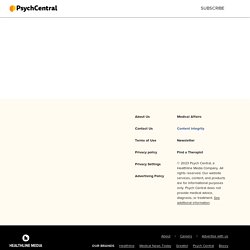
Reading Scientific Research Articles - Physics - LibGuides at Westmont College. Lecture1.dvi - ReadPaper.pdf. ReadingResearchPaper.pdf. Durbin, How to Read an Scientific Article. How to Analyze Figures From Research Papers. How to Analyze Figures from Research Papers Biology 601 fall 2006 Easton/Wadsworth. eastondp@buffalostate.edu wadswogj@buffalostate.edu.
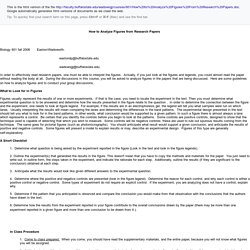
In order to effectively read research papers, one must be able to interpret the figures. Actually, if you just look at the figures and legends, you could almost read the paper without reading the body at all. CHECKLIST FOR EVALUATING A RESEARCH REPORT. Guidelines on how to evaluate a research article. Preparing to do Research, © Irene Ng Guidelines for Article Evaluation The following are four key criteria commonly used to assess the quality of researcharticles and academic thesis/dissertation.
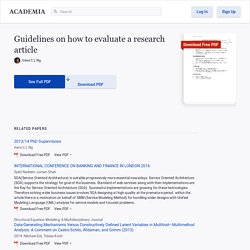
These are: 1. Theoretical/Conceptual Soundness Is the theory, if any, behind the research logically applied and thoroughly justified? Evaluating Sources of Information. Summary: Evaluating sources of information is an important step in any research activity. This section provides information on evaluating bibliographic citations, aspects of evaluation, reading evaluation, print vs. online sources, and evaluating Internet sources.
Critical Evaluation of a Published Paper. Bonine & Oh ECOL 437 Fall 2006 (modified from Pasch and Bonine 2003) Critical Evaluation of a Published Paper During the course of the semester we will be reading, presenting, “writing”, and critically evaluating journal articles (We will write our term papers as if we were writing a journal article, but with a modified Methods section and without the Results section).
Below is a checklist that follows closely the format of a scientific report, conventionally divided into 6 sections. Please use the checklist as a reference for your a) term paper, b) peer review, AND c) as a guide when reading journal articles in general. Abstract The abstract serves as a summary of the paper, presenting the purpose, scope, and major findings. How to evaluate journal articles.